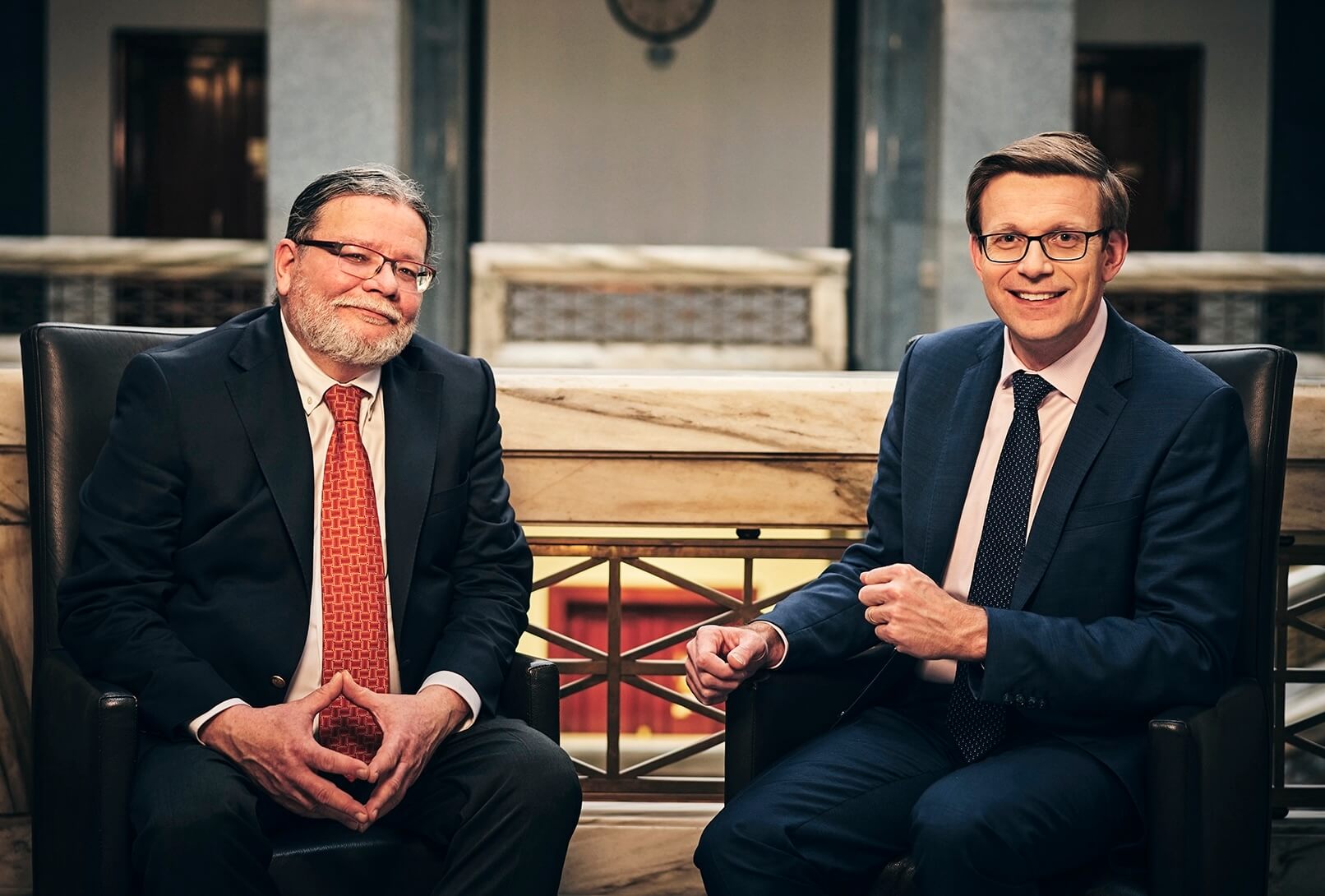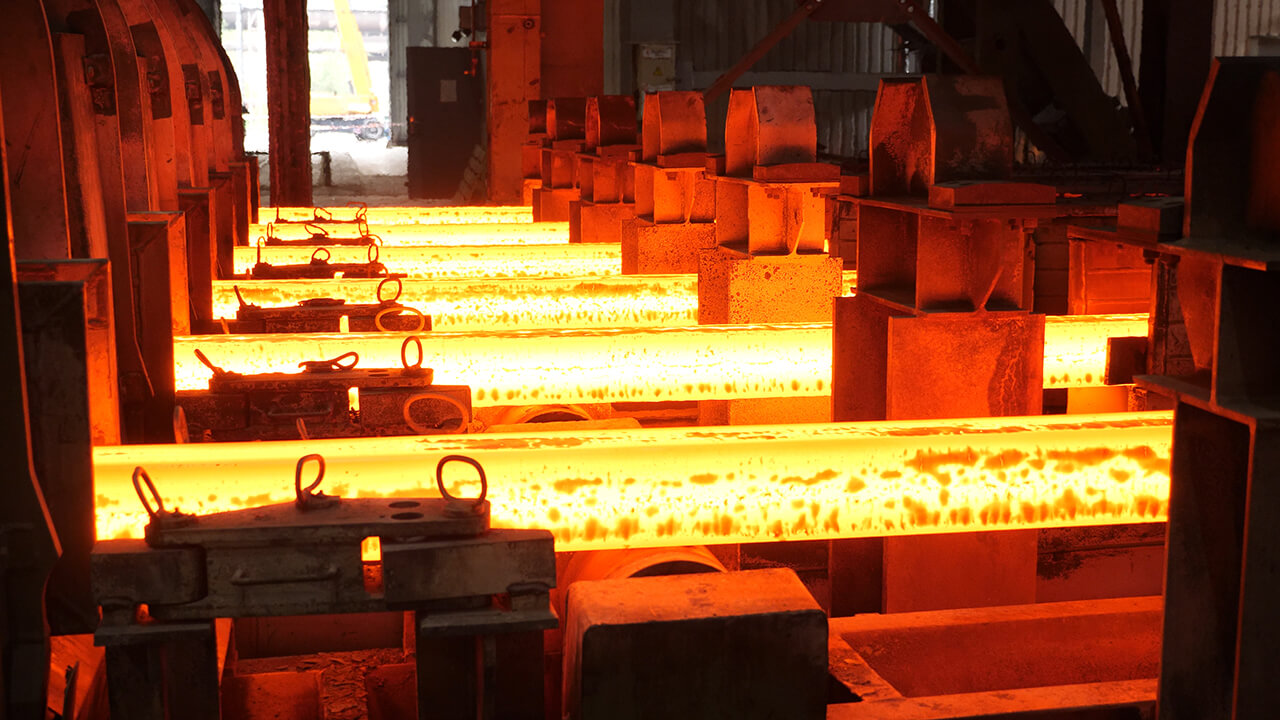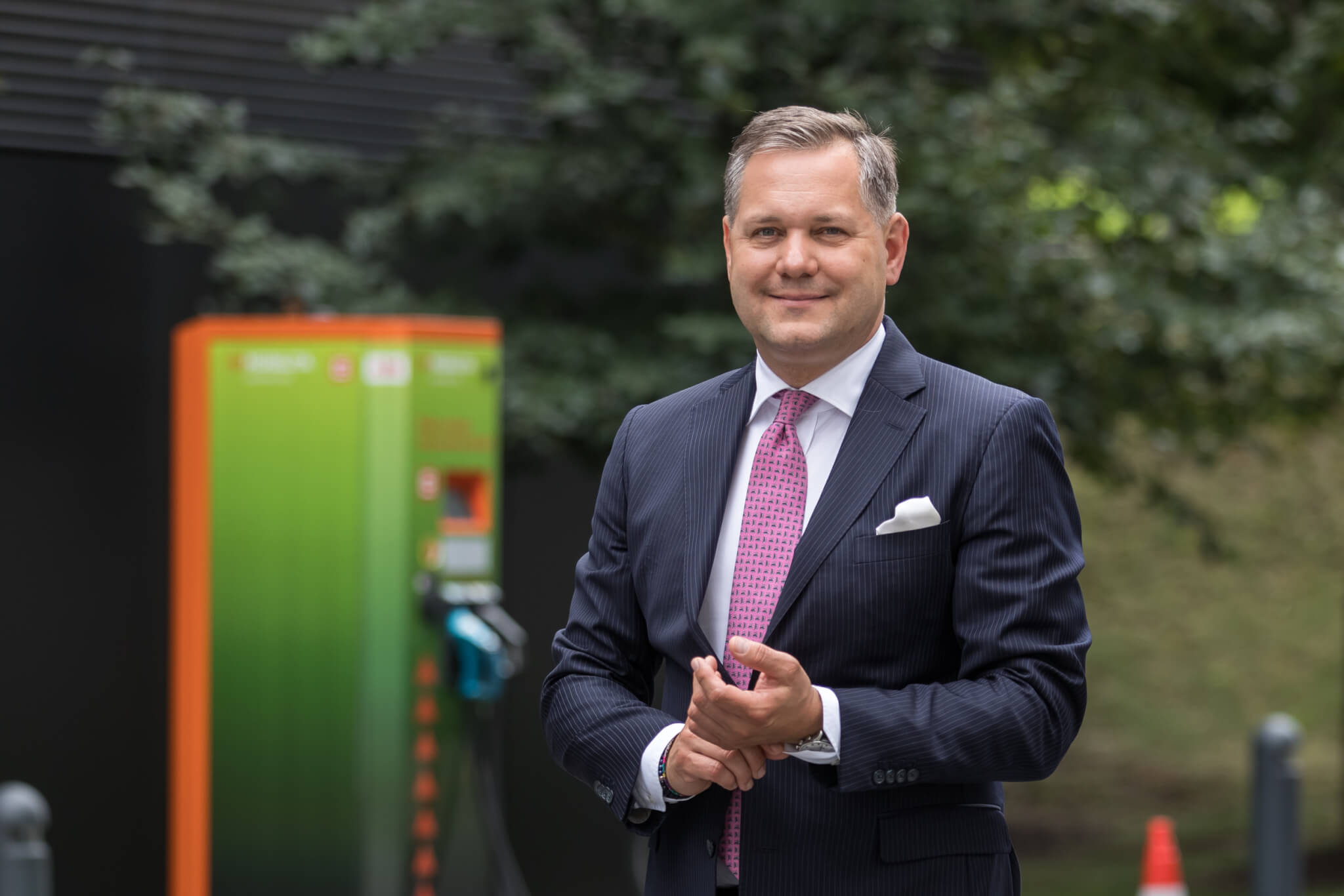“We don’t say: State, government, do it. We have our sleeves rolled up and we are ready to do the work,” emphasizes Zdeněk Zajíček, President of the Czech Chamber of Commerce.The strategic areas the Czech Republic should focus on are clear and entrepreneurs repeatedly tell the government their proposals on how to proceed – but somewhere it is fraying. Now is the time to do something, they say. “Few people realise how fast the train is going and how it is missing us,” says Zdeněk Zajíček.
Does the Czech Republic need a reboot? What should it look like? What was or should be the (re)starting shot?
In any case, after thirty relatively successful years, we need to set ourselves a new vision to pursue. And at the same time, we need to have a strategic plan to achieve those goals. And we can call that a reboot, a comeback. In any case, it should be a longer-term vision, perhaps for the next thirty years. Now we have about ten years ahead of us where we’re going to have to really turn it up a notch and catch up with others who have kind of missed out in the interim.
And we’re already “on”?
There is a lot in the pipeline somewhere, we just need to give it a firmer timetable. And somewhere we haven’t started yet, we are still stuck in place and afraid to make a decision.
In any case, we cannot focus on just one area. At the recent Czech Republic at the Crossroads conference, we identified areas where we think we need to make strategic investments. And it has to be done very quickly, in a matter of months, not years, because it will take ten years or more for the implementation to take place.
When you mentioned the conference, from the outside it looks like conferences are always being held, new initiatives are being developed and urgent areas are being identified, but that is where it remains. Isn’t it? For example, in June, the Government announced the creation of the Government Committee for Strategic Investment, which is to focus on investments in transport, housing, energy, education and science. You are also a member. What has this committee done so far?
In the meantime, they are meeting and trying to determine departmental coordination for those individual areas, because many of them are cross-departmental and represent a complex problem. We have already prepared a SWOT analysis for this purpose at the conference I mentioned, and we have identified key areas where something should be done. These are transport, data networks and rental housing in terms of ‘hard’ investments, and of the ‘soft’ ones, the labour market, education, science, research, innovation and bureaucracy. If we do nothing in these areas, the gap with other countries will widen.
For us, the conference was very meaningful, not least because it was probably the first time in thirty years that all the major business employers’ organisations agreed on the same material on the same stage.
You have agreed on eight priorities and you are now coordinating them in the Strategic Investment Committee. Is that not enough?
At the moment, working groups are being set up and each has to say what has already been worked out in that area and where there is consensus. The discussion on the labour market in the Czech Republic, for example, has been going very well so far. Business organisations, together with the Ministry of Labour and Social Affairs and the Ministry of the Interior, have agreed that we want a flexible and sustainable labour market and that this requires, among other things, mobilising the domestic labour force. This means removing the barriers that prevent all those who want to work, be they parents on parental leave, students, seniors and others, from being able to work. After we have activated all these people, we will certainly have plenty of vacancies to fill, for which we will have to invite labour from abroad.
“Business organisations, together with the Ministry of Labour and Social Affairs and the Ministry of the Interior, have agreed that we want a flexible and sustainable labour market and that this requires, among other things, mobilising the domestic workforce.”
Does the match have a concrete outcome yet?
Yes, by the end of the year there should be a clear plan of what needs to be done legislatively, what can be done differently, for example, through sub-legislative legislation, what needs to be done in terms of, for example, building a strong infrastructure to be able to handle the possible influx of foreign workers coming here.
Don’t you think that part of the workers needed today, especially in industry, could be replaced by advanced technologies, automation, robotization?
Robotics and automation can only be used in part of the processes. Even on an automated line in the automotive industry, a human must be available at certain stages. Of course, his qualifications are different today from how cars were made ten or fifteen years ago. And here we come to another area, namely education. Professions will change and we must find a way to encourage a push for lifelong learning and retraining. And how to reform the whole education system
And as for those foreign workers, it’s not just about machine operators. We must also try to attract the brains that will help us start new industries.
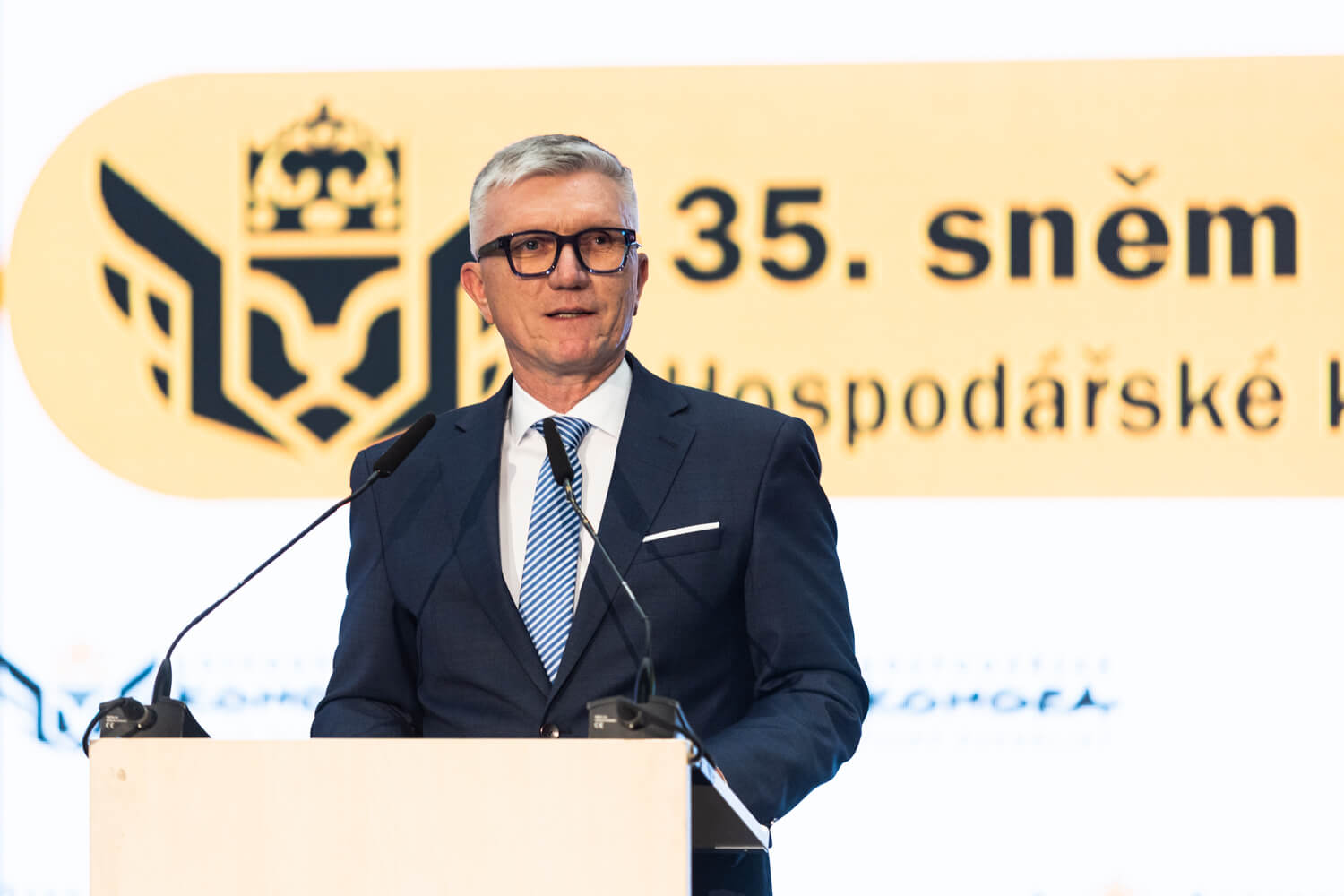
Zdeněk Zajicek at the 35th Congress of the Czech Chamber of Commerce. | Photo: Chamber of Commerce
How are you finding common ground with the Ministry of Education? Is there anything that has a concrete outline?
It’s not easy. The problem is the fragmented competencies between the Ministry of Labour and Social Affairs and the Ministry of Education, and possibly other institutions. We, as a business sector, would like to take on a much greater share of responsibility for lifelong learning, but the state should create the conditions for companies to want and be able to do this. That is what we want to talk about, how to do that.
Similarly with an effective dual education system, which we have been calling for for years. We would need it to work a little differently, like in Austria or Germany. The private sector, businesses, should have more competence in this.
What do you want from the government, from the ministries?
To hear our views, to know what companies need.
But these are all things you’ve been telling them for a long time, right?
Yes, you’re right that it’s all been said repeatedly and at length. Now we feel it’s high time. Few people realise how fast the train is going and how we’re missing it. I would liken it to the Titanic: there’s still a jazz band playing on board, caviar is being eaten and champagne is being drunk, but it’s already leaking below decks.
“Few people realise how fast the train is going and how we are missing it. I would liken it to the Titanic: there’s still a jazz band playing on board, people are eating caviar and drinking champagne, but it’s already leaking below deck.”
What generally prevents all the necessary changes from really taking off?
A broader professional and political consensus must be found, because all these projects are in most cases not feasible during the term of one government.
Take, for example, investment projects. In the previous period, under another government, there was a list of investment projects. The new government is not counting on it; it says that this is not what a list of strategic investments should look like. And we say: Let us sit down together and say together which specific investments should be. We as a business sector know this and we are able to justify it – in transport, in energy and other areas. It is then up to the government and other bodies to assess this in terms of security, international commitments and so on.
But we are not that far away. For now, a broad consensus on a national vision is being sought. That is why we have just come up with these eight core areas. Now the next steps should follow on from that, somebody has to determine whether a certain problem can be solved by a new law or a government decree, whether some treaties need to be concluded…
What if we can’t get it moving quickly?
Then there is a huge risk that companies will go wherever countries offer them better conditions, to Poland, Romania, Bulgaria. Our comparative advantages have already been exhausted. If companies leave, the money flowing into the state budget will be reduced and there will be no money to finance other projects. This could condemn us to a gradual decline and we would gradually atrophy. We will be an open-air museum in the middle of Europe, yet we have a favourable geographical and geopolitical location. But unless the business and investment environment here is favourable, we cannot take advantage of it. Just look at the construction pipeline in our country, it is one of the longest in the world.
The Czech Republic also has a big debt in digitalisation. Is there any progress there, at least so far in the Strategic Investment Committee? This should be an area on which everyone agrees.
The government committee deals with digitalisation in a rather cross-cutting way, because digitalisation is not a goal but a means to achieve progress in all other areas.
However, you must be experiencing this debt very painfully. Already in the middle of the first decade of this century, you and today’s Deputy Minister of Industry Edvard Kozusnik tried to develop the information society, modernise public administration and build something called e-government. It seems that not much has happened in twenty years.
In any case, it can be said that progress in this area has lost momentum – finally, as in other areas.
But some sub-projects are on track. I would like to mention, for example, the Ministry of Labour and Social Affairs, where Minister Marian Jureček has managed to put together a truly exceptional team after several years, and great things are happening there. And we, as the Chamber of Commerce, are happy to cooperate with them. For example, the unified monthly employer reporting is an absolutely revolutionary step. It will mean that you will only report for your employees in one place and only once and the different offices will pass it between themselves. This should be in place by next year and will mean the removal of a huge amount of red tape on both the employers’ and the government’s side.
Can you give another positive example?
It seems that times are bright in terms of science, research and innovation. In the near future, the law on transfer, or rather the amendment to the law on financing science and research, which should improve conditions and support the development of technology transfer, i.e. the transfer of scientific and research knowledge into practice, could go into the comment procedure. We need science, research and innovation to be financed predominantly from private sources and to add public ones. However, in Czech conditions, we have it set up in such a way that science and research are done primarily with public money, and this cannot bring the desired results. It is the private sector that is far better able to assess what makes sense to develop and to put energy and money into it. But, again, if we do not create a suitable environment for the private sector and just redistribute subsidies from public budgets, we will get nowhere.
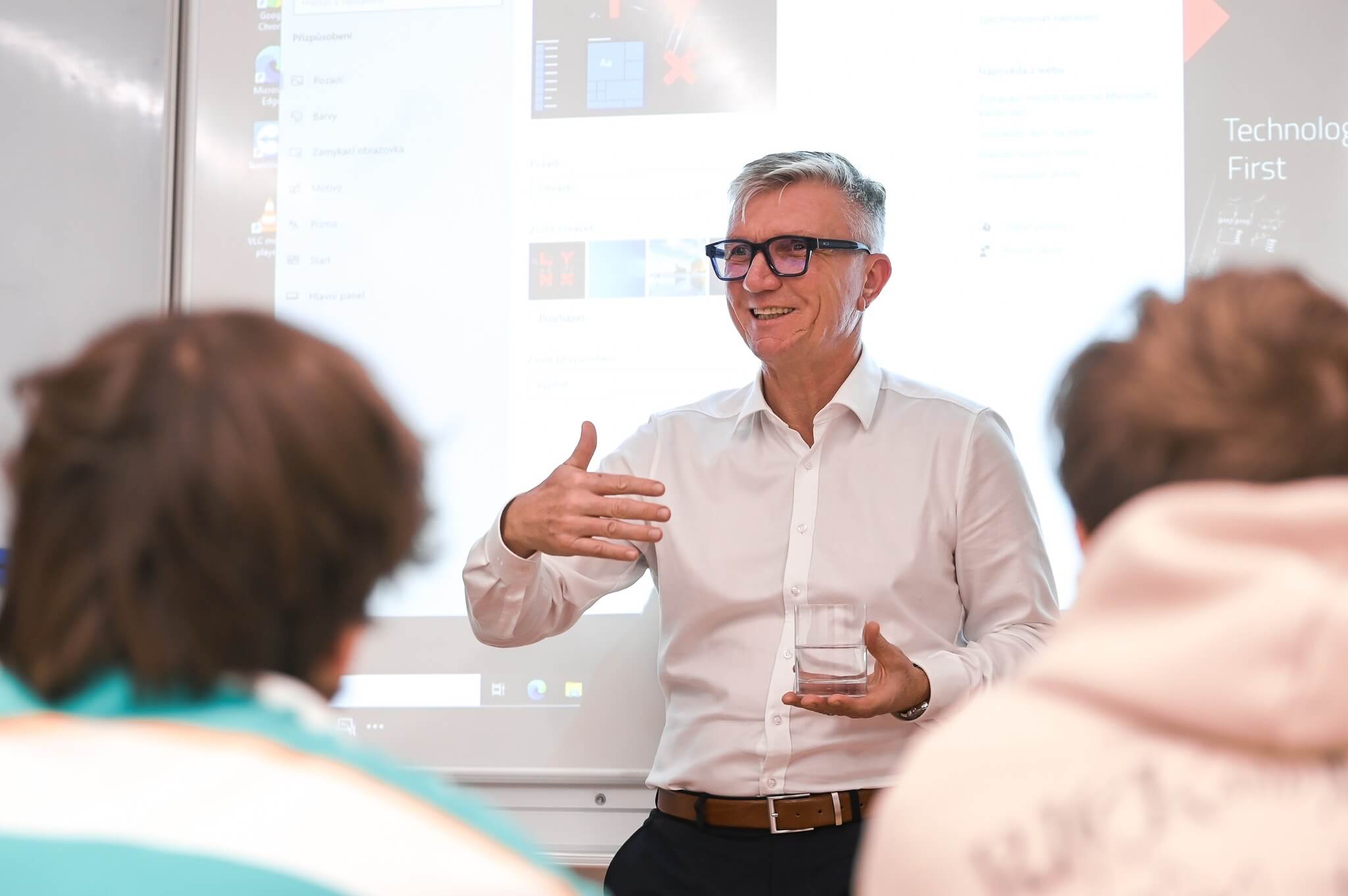
Zdeněk Zajíček during a discussion with students of political science and international relations at the Faculty of Social Sciences of Charles University. | Photo: Chamber of Commerce
So in most areas it’s really about setting the conditions.
Not always, but sometimes it’s really just about creating a stable environment and setting up conditions where no changes will be made for a few years.
But it’s not like we’re saying: State, government, do it! No, we’re here, we’ve rolled up our sleeves and we’re ready to do the work. Do you need a new law? We have legal experts, we can put resources into them and the law will be written in a short time. If we leave it to the ministries, it will take years.
This all doesn’t sound very optimistic. And we haven’t even started talking about energy, the Green Deal and transforming the economy. Will the transformation towards a green economy strengthen us, or do you see it as a problem for some reason?
The only thing I know, and what will certainly be true, is that the world is going to change very dramatically. And as it changes rapidly, some paths may turn out to be dead ends, and we may be going backwards.
“The world is going to change very dramatically. And as it changes rapidly, some paths may turn out to be blind alleys and we may be going backwards.”
You mean electromobility? Solar energy?
I don’t mean that this is a direct path in the wrong direction, but I wonder if it will have a future on this scale and if everything has to happen so quickly.
I think electric mobility is wonderful for certain types of cars and certain types of transport, but somewhere it doesn’t make economic sense. The other question is whether it can all be done in the time available and whether it can be financed. I have the feeling that Europe has set a huge pace with the Green Deal and other accompanying documents, and is heading in a direction that, in a way, puts us at a disadvantage compared with other continents that do not make such commitments in terms of climate protection. I think that these reservations from the corporate sector will grow stronger over time and perhaps there will be some revision, at least of the timeframe.
Is the Chamber of Commerce of the Czech Republic taking any steps in this direction? Or are you involved in Brussels in any way to soften or move forward the regulations related to decarbonisation? Or are you pushing the Czech government to engage in this?
We’re definitely involved. We have an automotive section in the chamber, so we also commented on the Euro 7 standard and I am very pleased that we have managed to revise it so that it really does lead to an improvement in the environment. Although the process is not quite over yet.
We are, of course, also commenting on alternative energy sources. Frankly, I do not know whether we in the Czech Republic are able to get as much from the sun and the wind as, say, Spain, whether we would be better off in that interconnected energy mix in the middle of Europe with nuclear and other energy sources that we have naturally had here for a long time. My feeling is that we are not yet building energy independence. Yet, according to all the forecasts, the whole of Europe could fall into an energy deficit in a relatively short time after all the coal-fired power stations have been shut down, and we will have nowhere to import energy from.
Already high energy prices will rise from the new year. Citizens and companies alike do not like this. According to some business bosses, prices are already on the edge of whether they should continue to run their businesses here or move abroad. Are you in talks with the relevant ministries to find a solution? In some neighbouring countries, representatives of the corporate sector have won some compensation so that the high energy prices do not make businesses less competitive.
Of course, energy prices are hurting businesses, although it is not as dramatic as last year. But, as you say, there will be a price hike again next year when the renewable energy charges and some other costs that have been covered by the state will be passed on to consumers. For companies, this would mean a significant price increase, according to our calculations, it could triple the costs. (The public consultation process is currently underway and the Energy Regulatory Office will issue the final amount by which the regulated part of the price should increase by the end of November.)
Mgr. Zdeněk Zajíček
 graduated from the grammar school in Prague and the Faculty of Law of Charles University. From 1991 he worked at the Municipal Prosecutor’s Office in Prague, then at the Ministry for the Administration of National Property and at the Land Fund. From 1996 to 1998 he was a member of the Chamber of Deputies, and from 2006 to 2013 he was successively Deputy Minister of the Interior, Minister of Justice and Minister of Finance. Since 2018 he has been a representative of the City of Prague. He is a member of the ODS and served as the party’s Deputy Chairman from 2022 to 2023. From 2020 to 2023 he was Vice President of the Chamber of Commerce of the Czech Republic, and since May 2023 he has been its President.
graduated from the grammar school in Prague and the Faculty of Law of Charles University. From 1991 he worked at the Municipal Prosecutor’s Office in Prague, then at the Ministry for the Administration of National Property and at the Land Fund. From 1996 to 1998 he was a member of the Chamber of Deputies, and from 2006 to 2013 he was successively Deputy Minister of the Interior, Minister of Justice and Minister of Finance. Since 2018 he has been a representative of the City of Prague. He is a member of the ODS and served as the party’s Deputy Chairman from 2022 to 2023. From 2020 to 2023 he was Vice President of the Chamber of Commerce of the Czech Republic, and since May 2023 he has been its President.
Next articles and interviews
Next articles and interviews
+ Show



 graduated from the grammar school in Prague and the Faculty of Law of Charles University. From 1991 he worked at the Municipal Prosecutor’s Office in Prague, then at the Ministry for the Administration of National Property and at the Land Fund. From 1996 to 1998 he was a member of the Chamber of Deputies, and from 2006 to 2013 he was successively Deputy Minister of the Interior, Minister of Justice and Minister of Finance. Since 2018 he has been a representative of the City of Prague. He is a member of the ODS and served as the party’s Deputy Chairman from 2022 to 2023. From 2020 to 2023 he was Vice President of the Chamber of Commerce of the Czech Republic, and since May 2023 he has been its President.
graduated from the grammar school in Prague and the Faculty of Law of Charles University. From 1991 he worked at the Municipal Prosecutor’s Office in Prague, then at the Ministry for the Administration of National Property and at the Land Fund. From 1996 to 1998 he was a member of the Chamber of Deputies, and from 2006 to 2013 he was successively Deputy Minister of the Interior, Minister of Justice and Minister of Finance. Since 2018 he has been a representative of the City of Prague. He is a member of the ODS and served as the party’s Deputy Chairman from 2022 to 2023. From 2020 to 2023 he was Vice President of the Chamber of Commerce of the Czech Republic, and since May 2023 he has been its President.

